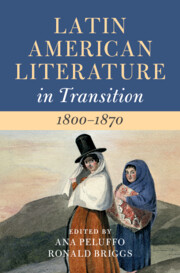Book contents
- Latin American Literature in Transition 1800–1870
- Latin American Literature in Transition
- Latin American Literature in Transition 1800–1870
- Copyright page
- Contents
- Figures
- Contributors
- Acknowledgments
- Introduction
- Part I Aesthetics of Disorder
- Chapter 1 The Paraguayan War Imagined
- Chapter 2 Networks of New World Authority
- Chapter 3 Artisans and Affective Labor
- Chapter 4 Reading (in) the Streets
- Chapter 5 Publicity and Print Culture
- Chapter 6 Literature and Political Corruption
- Chapter 7 Emotions and Politics in the Era of Caudillos
- Part II Affective Communities
- Part III Intersectional Subjectivities
- Part IV Transoceanic Consciousness
- Index
- References
Chapter 6 - Literature and Political Corruption
from Part I - Aesthetics of Disorder
Published online by Cambridge University Press: 24 January 2023
- Latin American Literature in Transition 1800–1870
- Latin American Literature in Transition
- Latin American Literature in Transition 1800–1870
- Copyright page
- Contents
- Figures
- Contributors
- Acknowledgments
- Introduction
- Part I Aesthetics of Disorder
- Chapter 1 The Paraguayan War Imagined
- Chapter 2 Networks of New World Authority
- Chapter 3 Artisans and Affective Labor
- Chapter 4 Reading (in) the Streets
- Chapter 5 Publicity and Print Culture
- Chapter 6 Literature and Political Corruption
- Chapter 7 Emotions and Politics in the Era of Caudillos
- Part II Affective Communities
- Part III Intersectional Subjectivities
- Part IV Transoceanic Consciousness
- Index
- References
Summary
General Juan Facundo Quiroga’s terrible reputation did not begin with Domingo F. Sarmiento’s Facundo (1845).1 Actually, it was started by his Unitarian enemies in the late 1820s and early 1830s and preceded the famous book by many years.
- Type
- Chapter
- Information
- Latin American Literature in Transition 1800–1870 , pp. 102 - 113Publisher: Cambridge University PressPrint publication year: 2022

